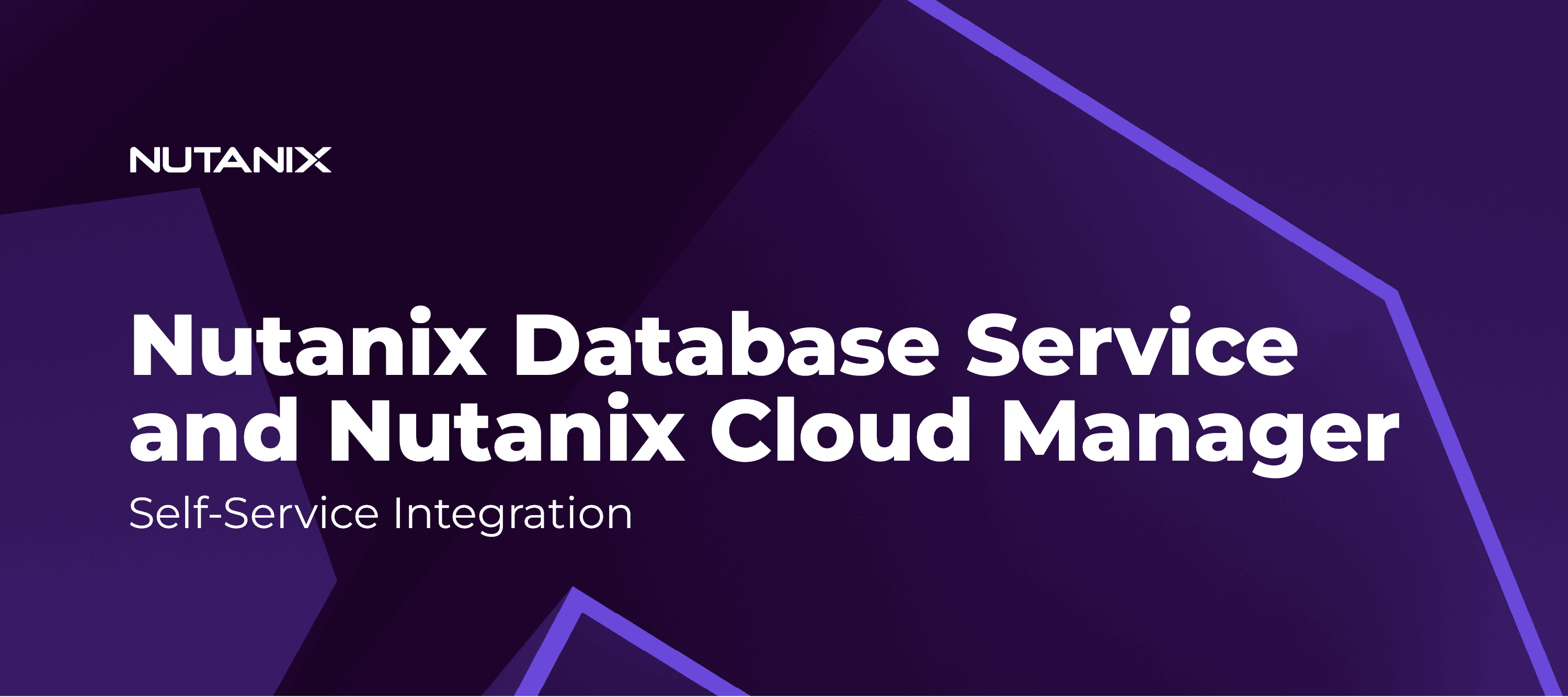In today's hybrid cloud world, efficient database administration and streamlined cloud automation are crucial for organizations striving to achieve optimal performance and productivity. Nutanix, a leading provider of enterprise cloud solutions, offers two powerful products that significantly simplify and automate these processes: Nutanix Database Service (NDB) and Nutanix Cloud Manager (NCM) Self-Service. The integration of these two solutions enables organizations to unleash the full potential of their databases and harness the benefits of hybrid cloud automation.
Nutanix Database Service (NDB) is a database as a service offering that automates and simplifies database administration. With NDB, organizations can automate and simplify the provisioning and life cycle management of databases. Leveraging NDB's one-click simplicity, users can effortlessly set up and manage a wide range of databases, including PostgreSQL, MySQL, MS SQL, Maria DB, Mongo DB, and Oracle.
Nutanix Cloud Manager (NCM) Self-Service provides a powerful hybrid cloud automation and lifecycle management capabilities. NCM Self-Service allows users to create entities such as blueprints and runbooks, either through a user-friendly interface or via Python code. Blueprints enable the provisioning of complex applications, while runbooks facilitate the execution of intricate orchestration workflows. NCM self-service runbooks are particularly beneficial in non-application-centric scenarios, as they automate routine tasks and procedures, enhancing operational efficiency.
The Why?
In the ever-evolving landscape of hybrid cloud automation, the seamless integration of Nutanix products has become paramount to optimize productivity and user experience. The integration of NDB and NCM Self-Service opens up a realm of possibilities for organizations seeking simplicity, efficiency, and automation. Users can now leverage the power of NDB's streamlined database administration alongside robust hybrid cloud automation offered by NCM Self-Service. The latest release of NCM Self-Service (formerly Calm) heralds a significant milestone in the journey of leveraging the combined power of NDB and NCM Self-Service. This integration streamlines the process of managing databases at scale on Nutanix infrastructure, providing unparalleled convenience for administrators and end users alike.
Key advantages offered by this integration include
- A Unified Control Plane: With NDB and NCM Self-Service seamlessly integrated, users gain access to a centralized control panel. This empowers database administrators to efficiently provision and manage databases by leveraging self-service runbooks with NDB actions and tasks. By publishing these in the Nutanix Marketplace, the process of provisioning NDB databases becomes effortlessly streamlined. In the absence of this integration, the NDB actions and operations were achieved using the NDB APIs called from either the HTTP tasks or eScripts within NCM Self-Service runbooks. .
- Enhanced Automation Capabilities: The integration with NCM Self-Service offers an array of additional automation capabilities. For instance, administrators can effortlessly execute actions or tasks during pre- and post-database creation. This enables advanced scenarios such as reserving an IP address from an external IPAM and assigning it to the database VM created by NDB to host the database. These complex tasks can now be easily achieved through the user-friendly NCM Self-Service runbook.
The How?
First and foremost, NCM self-service now allows adding NDB accounts within Nutanix. In addition, these NDB accounts can be included within one or more projects.
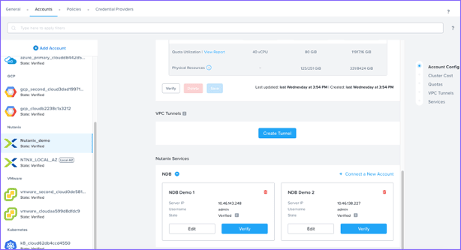
To further bolster the automation capabilities of NCM Self-Service, a new option called "Database Operations" has been introduced within the Task type of NCM Self-Service runbooks. The "Database Operations" option allows further selection of Account, Resource Type, and Action.
Currently, the following Resource type and Actions are available for Database Operations task type.

Let us look at an example runbook.
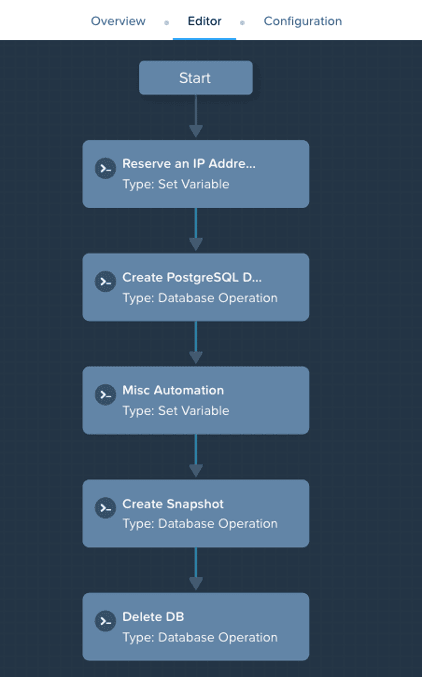
The example runbook depicted above has 5 tasks.
Task 1: Reserves an IP address by making an API call to an external IPAM and sets an output variable "IPAM_static_ip"
Task 2: Uses the PostgreSQL DB instance action "Create" to create a DB instance along with the DB server VM. The output variable IPAM_static_ip from Task 1 is used as an input in the IP Address field for the DB server VM.
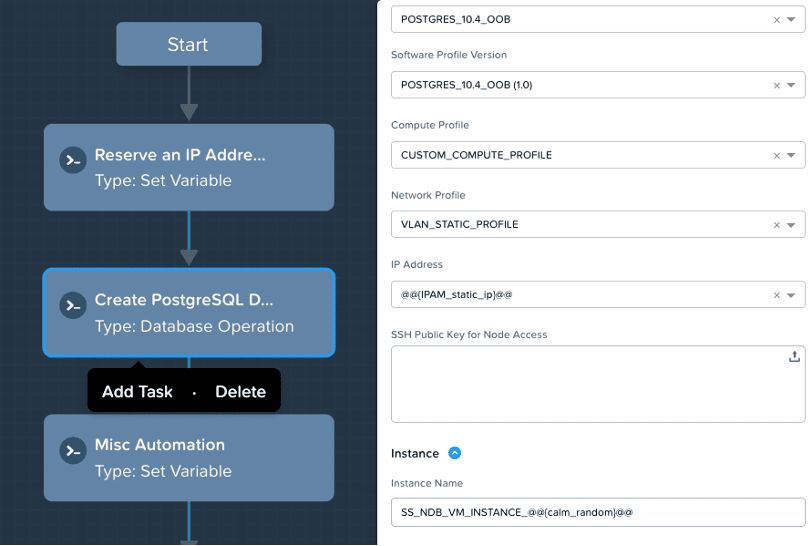
Additionally, Task 2 also sets the attributes obtained after database create as output variables by default. These variables can be used in subsequent tasks within the runbook.
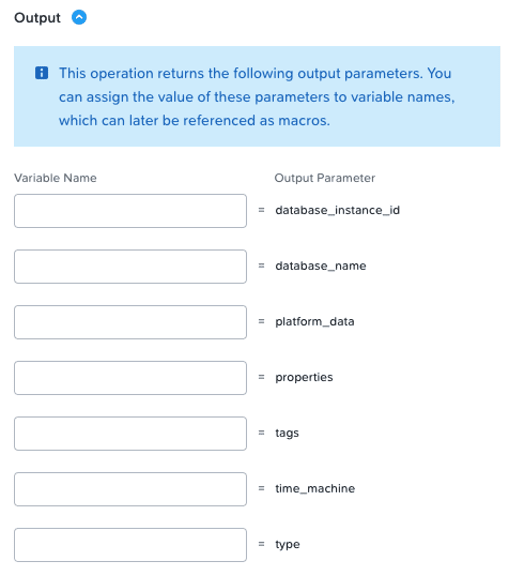
Task 3: This is a placeholder task to execute any miscellaneous automation tasks either outside of the database instance or on the database instance. The tasks could be as simple as extracting the time machine ID from the output of Task 2 or a writing operation on the database tables itself. In our example, we extracted the time machine ID and set the output variable "time_machine_id".
Task 4: A snapshot of the database created and modified (if need be) is taken in this task. A primary input for this task execution will be the time_machine_id that is obtained from the Task 3.
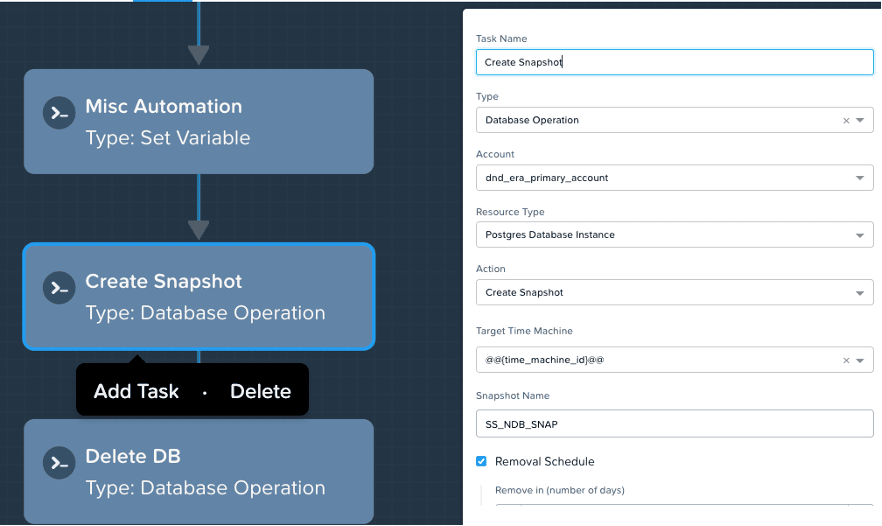
Task 5: Finally, the database is deleted in this task. The database_instance_id that is set as a default output variables in Task 1 is needed for this task to run successfully.
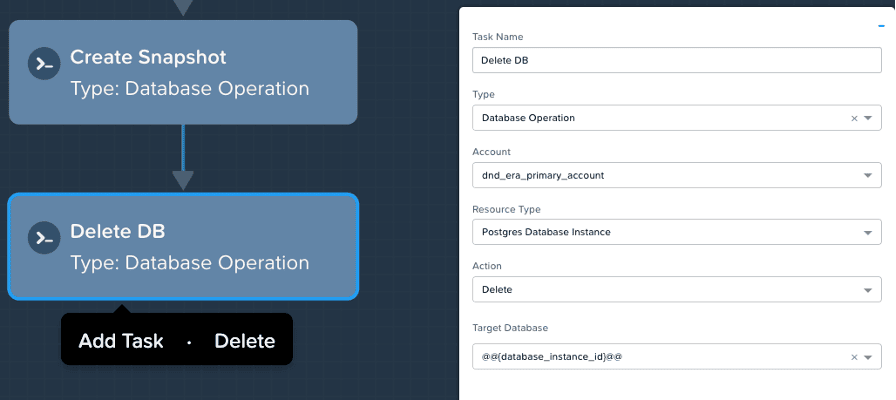
The integration of NDB with NCM Self-Services marks a significant step in bringing all Nutanix services under a single umbrella and providing a single point of entry to consume all Nutanix Services. This feature is currently available in Calm 3.7.0. For more information and a detailed user guide, please refer to the Nutanix documentation.

